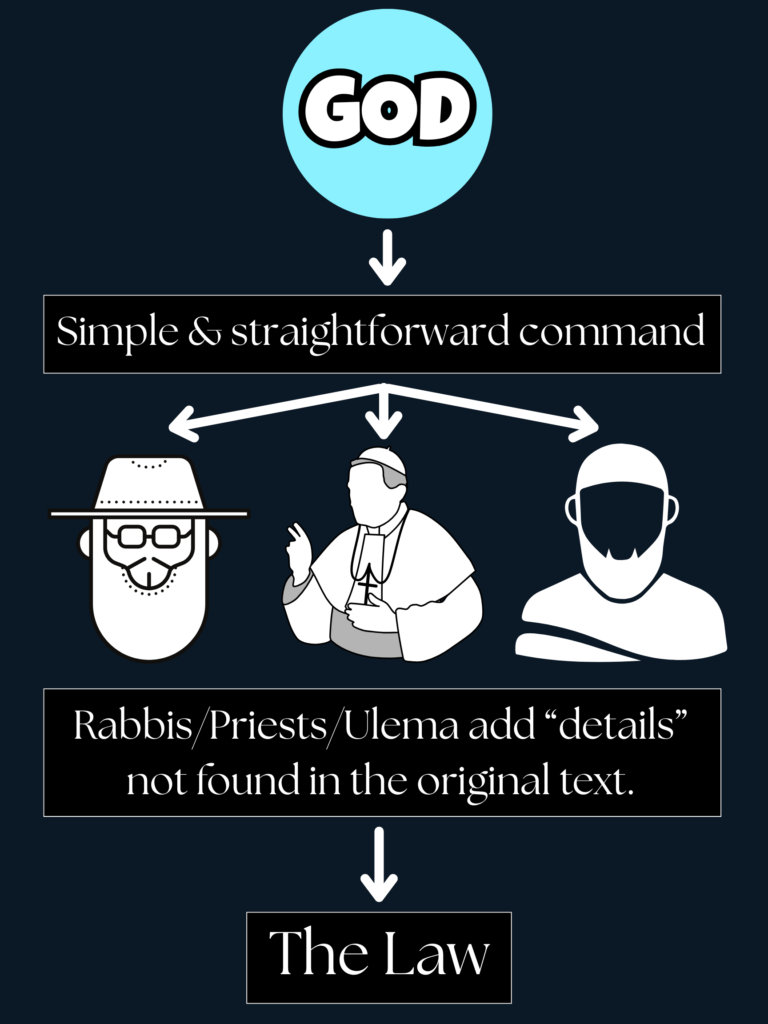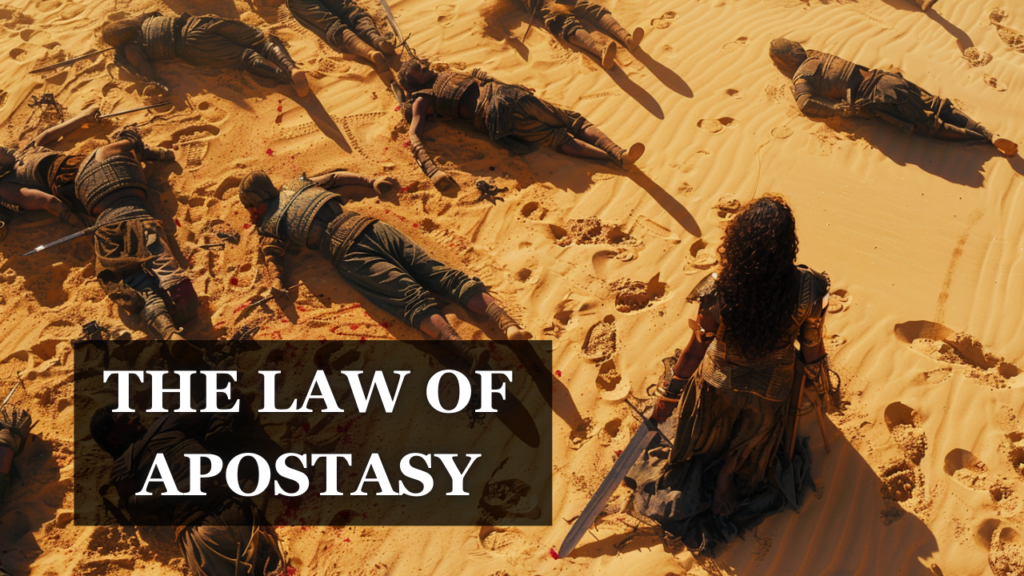The Quran warns in 9:31 and 42:21-
They have set up their religious leaders (rabbis) and scholars (monks) as lords,± instead of GOD. Others deified the Messiah, son of Mary. They were all commanded to worship only one god. There is no god except He. Be He glorified, high above having any partners.
ٱتَّخَذُوٓا۟ أَحْبَارَهُمْ وَرُهْبَـٰنَهُمْ أَرْبَابًۭا مِّن دُونِ ٱللَّهِ وَٱلْمَسِيحَ ٱبْنَ مَرْيَمَ وَمَآ أُمِرُوٓا۟ إِلَّا لِيَعْبُدُوٓا۟ إِلَـٰهًۭا وَٰحِدًۭا ۖ لَّآ إِلَـٰهَ إِلَّا هُوَ ۚ سُبْحَـٰنَهُۥ عَمَّا يُشْرِكُونَ ٣١
They follow idols who decree for them religious laws never authorized by GOD. If it were not for the predetermined decision, they would have been judged immediately. Indeed, the transgressors have incurred a painful retribution.±
أَمْ لَهُمْ شُرَكَـٰٓؤُا۟ شَرَعُوا۟ لَهُم مِّنَ ٱلدِّينِ مَا لَمْ يَأْذَنۢ بِهِ ٱللَّهُ ۚ وَلَوْلَا كَلِمَةُ ٱلْفَصْلِ لَقُضِىَ بَيْنَهُمْ ۗ وَإِنَّ ٱلظَّـٰلِمِينَ لَهُمْ عَذَابٌ أَلِيمٌۭ ٢١
9:31 does not mean Jews and Christians bowed and prostrated to rabbis and priests. It means they obeyed man-made laws as if they were divine, thus making partners with God. Quran 42:21 repeats the same warning: “Do they have partners who legislate for them religious laws not authorized by God?” For example:
The Goat in Its Mother’s Milk
Exodus 23:19 – “You are to bring the best of the first fruits of your soil to the house of the Lord your God. “You are not to boil a young goat in its mother’s milk.”
Exodus 34:26 – “You are to bring the best of the first fruits of the ground to the house of the Lord your God. “You are not to boil a young goat in its mother’s milk.”
Deuteronomy 14:21 – “You must not eat any carcass, but you may give it to the alien in your cities so he may either consume it or sell it to a foreigner, since you are a people that is holy to the Lord your God. “You must not cook a young goat in its mother’s milk.”
The Torah states in three places: “You shall not boil a young goat in its mother’s milk.” Simple and clear. Rabbis transformed it into an elaborate system of dietary laws, including separate dishes and waiting hours between meals. The following demonstrates their deductions-
Bekhor Shor
Plainly, “cook” in this verse implies “ripen” or “bring to completion,” as in “her clusters of grapes ripened” (Gen 40:10). The verse may mean we should not let a young goat grow by feeding it its mother’s milk indefinitely; rather, we should separate it early, like we bring first fruits. However, the actual prohibition of cooking meat in milk remains: cooking an animal in the very substance that nourished it is cruelty. While any young animal applies, goats in particular produce much milk and bear multiple offspring, making it possible to cook the kid in its milk. Rabbi Yossi the Galilean excludes birds (which lack milk), but not out of mercy—for the Torah wanted Israelites to avoid cruelty.
Birkat Asher (on Rashi)
Rashi interprets “first fruits of your land” as including offerings in the seventh (sabbatical) year. At that time, fields are unguarded and the first fruits could be harvested improperly without special marking. Rabbi David Pardo supports this in Shoshanim L’David.On the translation, Onkelos renders “You shall not cook a kid in its mother’s milk” as “You shall not eat meat with milk” in three places. Even though Onkelos typically avoids rabbinic interpretations, here he added the prohibition of eating together (not just cooking together), to prevent misinterpretation that separately cooked meat and milk might be allowed. He altered the literal text to reflect this broader prohibition.
Rashi includes calves and lambs in “kid,” and consistently places the interpretation before the literal meaning, which departs from his usual pattern.
U. Cassuto
Cassuto notes the phrase follows the command about bringing first fruits to the Temple, drawing a contrast: unlike Canaanite ritual practices—possibly involving cooking young animals in milk—Israel is forbidden. Maimonides suggested the law distances Israel from pagan customs. Ugaritic texts confirm such practices among Canaanite fertility rites. The practice survives today among Bedouins, reinforcing the prohibition as cultural repudiation.
Chanukat HaTorah
A Midrash records the angels questioned God’s giving Israelites extra caution. God replied they had eaten meat and milk at Abraham’s table, yet this generation must be stricter. Moses requested to change “kid” to “meat” to avert heretic confusion. God insisted on the original wording, tying it to the covenant with Israel and not with angels—indicating that the law applies precisely to “kid,” affirming divine exactness.
Exodus 23:19 (and again in 34:26, Deut 14:21):
“You shall not cook a kid in its mother’s milk.”
On the surface, this is a very specific command: don’t take the mother’s milk (the very substance that nourished the young) and use it to cook that young animal. It’s about cruelty and unnatural reversal of life’s order.
Onkelos (Targum) → He deliberately mistranslates: instead of “do not cook,” he writes “do not eat meat with milk.” This changes a one-situation prohibition into a general dietary law.
Rashi → Says “kid” doesn’t just mean goat, but includes calves and lambs. He also says the verse prohibits not only cooking, but eating and even deriving benefit (selling, profiting) from meat-milk mixtures.
Midrash (Chanukat HaTorah) → Claims Moses wanted to change the word from “kid” to “meat” to avoid confusion, but God insisted. This is a storytelling hadith-like justification for why the law applies more broadly than the text states — very similar to hadith stories that “explain” why the Quran says one thing but the practice is another.
Cassuto & Maimonides → Argue the law was about avoiding pagan practices (Ugaritic fertility rites where milk and meat were mixed). This changes the reason for the law entirely, detaching it from the words on the page.
Through these expansions, the rabbis created:
- A blanket ban on eating any meat with any dairy.
- New laws about waiting hours between eating meat and dairy.
- Kitchen laws about separate dishes, utensils, sinks, etc.
None of this is in the Torah text. All of it is rabbinic elaboration. What the rabbis did with Exodus 23:19 looks very much like what hadith compilers did with the Quran:
- Midrash = Hadith Qudsi/Asbab al-Nuzul → Stories to “explain” why God revealed verses, often expanding or shifting the meaning.
- Rashi = Hadith commentators → Adding “details” not in the text, making the verse cover more than it actually says.
- Onkelos = Mis-translating hadith style → Changing words to enforce rabbinic law, just as hadith sometimes rewrites the sense of a verse.
The pattern is identical: take a narrow text, bring in stories, commentary, and rulings, and end up with an entire legal system outside of scripture. That Midrash comment from Chanukat HaTorah sounds just like a hadith: a fabricated backstory where Moses argues with God, justifying why the wording is the way it is. It’s narrative law-making.
Adonai” instead of the Divine Name (YHWH)
There is a longstanding practice within Judaism of censoring the name of God textually by placing a dash between G and D (G-D) or substituting the name of God with Adonai (Lord) or HaShem (The Name). God’s name appears over 7,000 times in the Hebrew Bible. The command to call on the Name of YHWH (Gen. 4:26, Ps. 116:17) was effectively censored, leaving future generations disconnected from what God Himself commanded to invoke.
Genesis 4:26 – “Then men began to call upon the name of YHWH.”
Genesis 12:8 – Abraham “built an altar to YHWH and called upon the name of YHWH.”
Genesis 26:25 – Isaac “built an altar there and called upon the name of YHWH.”
1 Kings 18:24 – Elijah: “You call on the name of your gods, and I will call on the name of YHWH, and the God who answers by fire, He is God.”
Psalm 116:17 – “I will offer to You a sacrifice of thanksgiving and call on the name of YHWH.”
Joel 2:32 – “Everyone who calls on the name of YHWH shall be saved.”
Deuteronomy 28:10 – “All the peoples of the earth shall see that you are called by the name of YHWH.”
Deuteronomy 32:3 – “For I will proclaim the name of YHWH; ascribe greatness to our God!”
Numbers 6:27 – “So shall they put my name upon the people of Israel, and I will bless them.”
The verses above show us that God wants people to call upon Him, with verses explicitly stating that we should call upon YHWH. Some rabbinic interpretations cite verses like:
Deuteronomy 12:3–4 – “You shall break down their altars, smash their sacred pillars, burn their Asherah poles, and obliterate the names of their gods from that place. You shall not do so to YHWH your God.” their Asherah poles, and obliterate the names of their gods from that place. You shall not do so to YHWH your God.”
Exodus 20:7 – “You shall not take the name of YHWH your God in vain.”
The Talmud (Shavuot 35a) expands on Deuteronomy 12:4, warning that God’s Name must never be erased or disrespected. Over centuries, this principle evolved into a strict fence around the Name: the literal command to call upon YHWH was reframed into avoiding pronouncing or writing His Name directly.
This innovation gave rise to replacement formulas like Adonai and HaShem, which became entrenched in prayer, writing, and even translations. The original biblical intent (the remembrance of God’s Name [zikr]) was inverted into a culture of textual censorship. The Torah emphasizes God’s Name as central to worship and covenant relationship, yet the very measures meant to preserve reverence gradually obscured the practice itself. A command designed to bring humanity closer to God and to proclaim, bless, and call upon YHWH was effectively removed from daily life.
In both cases:
- The Torah provides a specific command.
- Rabbinic interpretation introduces additional restrictions.
- The original practice is either limited or inverted.
- Later generations inherit the innovation as binding law, often unaware of the original textual intent.

Just as Jewish rabbis created fences around the Torah, like turning a prohibition on cooking a baby goat in its mother’s milk into a sweeping meat-and-dairy law, or censoring God’s Name in daily speech, Muslim jurists (ulema) have at times expanded, limited, or interpreted Quranic commands to regulate behavior in ways not explicit in the Qur’an itself.
Wudu (ablution)
4:43 – O you who believe, do not observe the Contact Prayers (Salat) while intoxicated, so that you know what you are saying. Nor after sexual orgasm without bathing, unless you are on the road, traveling; if you are ill or traveling, or you had urinary or fecal-related excretion (such as gas), or contacted the women (sexually), and you cannot find water, you shall observe Tayammum (dry ablution) by touching clean dry soil, then wiping your faces and hands therewith. GOD is Pardoner, Forgiver.
5:6 – O you who believe, when you observe the Contact Prayers (Salat), you shall: (1) wash your faces, (2) wash your arms to the elbows, (3) wipe your heads, and (4) wash your feet to the ankles. If you were unclean due to sexual orgasm, you shall bathe. If you are ill, or traveling, or had any digestive excretion (urinary, fecal, or gas), or had (sexual) contact with the women, and you cannot find water, you shall observe the dry ablution (Tayammum) by touching clean dry soil, then rubbing your faces and hands. GOD does not wish to make the religion difficult for you; He wishes to cleanse you and to perfect His blessing upon you, that you may be appreciative.
Key points:
- Only four steps for wudu: face, arms, head, feet.
- Clear allowance for hardship (illness, travel, lack of water).
- No additional rituals, sequences, or specific timings are mandated.
Later Jurisprudence – Added Details
Islamic jurists (fiqh scholars) later elaborated wudu into a more complex ritual:
- Number of Washes – Must wash each part three times.
- Specific Steps for Fingers, Toes, Mouth, Nose – Added details not in the Quran.
- Invalidation Rules – Additional acts (touching the opposite gender, bleeding) can invalidate wudu.
A simple, practical command has been expanded into a detailed ritual system that sometimes obscures the Quran’s original flexibility and ease. The Quran teaches straightforward ablution: wash your face, wash your arms to the elbows, wipe your head, and wash your feet to the ankles. For major ritual impurity after sexual contact, bathe completely. When water is unavailable, use clean, dry soil to wipe your face and hands. These instructions include merciful allowances for illness, travel, and other hardships. Subsequent jurists expanded these simple requirements by requiring each part to be washed three times, including specific attention to fingers, toes, mouth, and nose, following complex invalidation rules, and observing precise timing requirements. These additions go beyond the Quranic commands and create complications where God intended simplicity.


EDUCATE ,EDUCATE AND EDUCATE. EXC ELLENT RESEARCH.
[WHAT THE CURRENT ABLUTION=HAITAN VOODO0]
[THERE IS NO WORD WUDU IN THE HOLY BOOK-IS IT]
the following has 9 parts
https://www.linkedin.com/pulse/ablution-%D9%88%D8%B6%D9%88-wudu-genders-god-true-meaning-%D8%A3%D9%8A%D9%87%D8%A7-%D8%A2%D9%85%D9%86%D9%88%D8%A7-dr-kashif-khan/